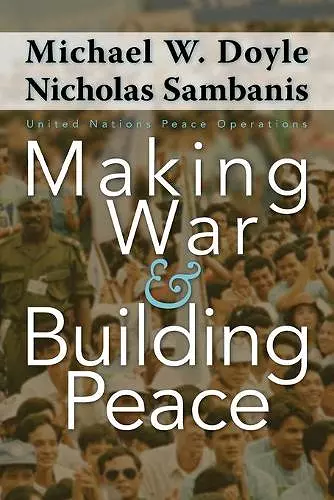Making War and Building Peace
United Nations Peace Operations
Michael W Doyle author Nicholas Sambanis author
Format:Paperback
Publisher:Princeton University Press
Published:27th Jun '06
Should be back in stock very soon

A balanced assessment of the record of United Nations peace operations. It provides encouraging insights into the future role of the United Nations in helping countries make the transition from war to peace. -- Kofi A. Annan, Secretary-General of the United Nations This magisterial work is the single best study of United Nations peacekeeping available. It combines sophisticated quantitative analysis and intensive case studies in a way that is a model for future studies. -- Roy Licklider, Rutgers University This book will certainly draw attention among scholars, because it advances both the statistical analysis of conflict and the empirical study of UN missions. It will appeal to audiences in both camps. Very engaging in style, covering a wide range of material, and exhibiting conceptual sophistication and originality, it provides a framework for a new generation of scholarly literature on civil wars and peace missions. -- Ian Hurd, Northwestern University
Examines how well United Nations peacekeeping missions work after civil war. Statistically analyzing all civil wars since 1945, this book compares peace processes that had UN involvement to those that didn't. It argues that each mission must be designed to fit the conflict, with the right authority and adequate resources.Making War and Building Peace examines how well United Nations peacekeeping missions work after civil war. Statistically analyzing all civil wars since 1945, the book compares peace processes that had UN involvement to those that didn't. Michael Doyle and Nicholas Sambanis argue that each mission must be designed to fit the conflict, with the right authority and adequate resources. UN missions can be effective by supporting new actors committed to the peace, building governing institutions, and monitoring and policing implementation of peace settlements. But the UN is not good at intervening in ongoing wars. If the conflict is controlled by spoilers or if the parties are not ready to make peace, the UN cannot play an effective enforcement role. It can, however, offer its technical expertise in multidimensional peacekeeping operations that follow enforcement missions undertaken by states or regional organizations such as NATO. Finding that UN missions are most effective in the first few years after the end of war, and that economic development is the best way to decrease the risk of new fighting in the long run, the authors also argue that the UN's role in launching development projects after civil war should be expanded.
"This book will have wide appeal not only among scholars who study the issues of civil war, its termination, and the role of the UN and the international community, but also among any students and policymakers who are interested in one of the most fundamental and pressing questions of our time: how to build peace in states that are trying to recover from devastating civil wars."--Lise Howard, Review of International Organizations
ISBN: 9780691122755
Dimensions: unknown
Weight: 567g
424 pages